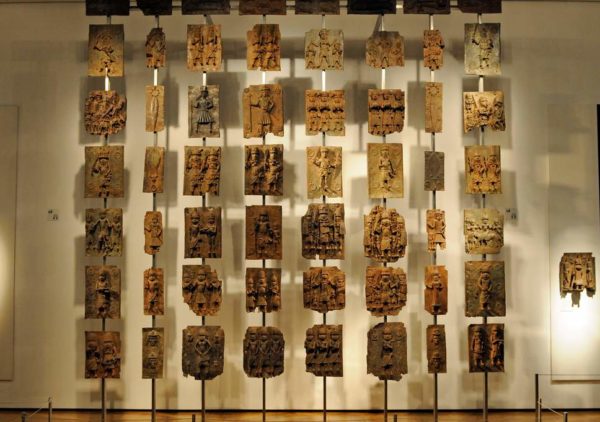More than two dozen artifacts held in the Smithsonian’s National Museum of African Art have been returned to the region where they were seized.
The D.C. museum will repatriate 20 Benin bronzes to Nigeria and transfer ownership of an additional nine that it will borrow for its exhibit. The 29 historic brass plates from the Benin Kingdom are a fraction of the 10,000 items looted as British troops burned the royal place in modern-day Edo State, Nigeria, in 1897.
Nigeria’s minister of information and culture, Lai Mohammed, said “by returning the artifacts” the Smithsonian is “writing new pages in history. Their brave decision to return the timeless artworks is worth emulating.”

The artifacts were reportedly auctioned to about 165 museums all over the world. Nigeria has been attempting to get the artifacts back since the country gained its independence 62 years ago and has also considered borrowing them from some museums.
The British Museum has the largest collection of Benin objects, with about 900 pieces. London’s Horniman Museum and Gardens announced in August the transfer of ownership of 72 historic objects, including the brass plates known as Benin bronzes. Oxford and Cambridge universities announced in late July that they would return more than 200 bronzes between them. In October, a Cambridge University college and a Paris museum returned some of their Benin artifacts.
The Smithsonian’s Board of Regents voted to return the bronzes in June as part of its new ethical returns policy. The policy calls for Smithsonian museums to return collections to “the community of origin based on ethical considerations, such as the manner and circumstances in which the items were originally acquired.”
After a review of its collection last year, the Smithsonian found the National Museum of African Art includes 39 pieces from the Benin Kingdom. The additional six bronzes required more research to determine how they were acquired.
The transfer of ownership of the 29 bronzes was marked with a ceremony at the National Museum of African Art Tuesday, Oct. 11.
“Not only was returning ownership of these magnificent artifacts to their rightful home the right thing to do, it also demonstrates how we all benefit from cultural institutions making ethical choices,” said Lonnie Bunch III, secretary of the Smithsonian, in a statement.
The policy change is the first of its kind for the 176-year-old institution since 2001. The Benin bronzes are the first repatriated under the policy. The Museum of African Art removed them from view last fall. The institution hopes the move will inspire other museums to do the same.
“The Smithsonian is humbled and quite honored to play a small part by transferring ownership to helping to bring long-delayed justice, long-delayed visibility, long-delayed objects brought back to Nigeria,” Bunch said at the ceremony. “We realize as an institution that we are shared stewards of these collections. We are not owners.”
A Washington Post review of 70 museums found that of the 56 that have Benin objects, 16 are in the process of giving them back. However, critics have questioned how much museums will follow through and raised concerns about the care of artifacts once returned.
Prince Aghatise Erediauwa, speaking on behalf of the Benin Kingdom on Tuesday, slammed the criticism.
“The truth is that no argument can change looted works into unlooted works or stolen works into unstolen works. There is simply no moral or legal basis for persistently retaining cultural property looted during military expeditions or in unequal negotiations, for that matter,” he said. “This demand by a few art historians and curators serves no purpose other than their own self-interest. We are grateful to you and others who are on the side of truth and acknowledge where these works truly belong.”
The Smithsonian’s National Museum of Natural History has a collection of 20 Benin bronzes. Research on the objects is still ongoing, but the museum will submit a request to the Board of Regents to return bronzes obtained during the 1897 expedition.


